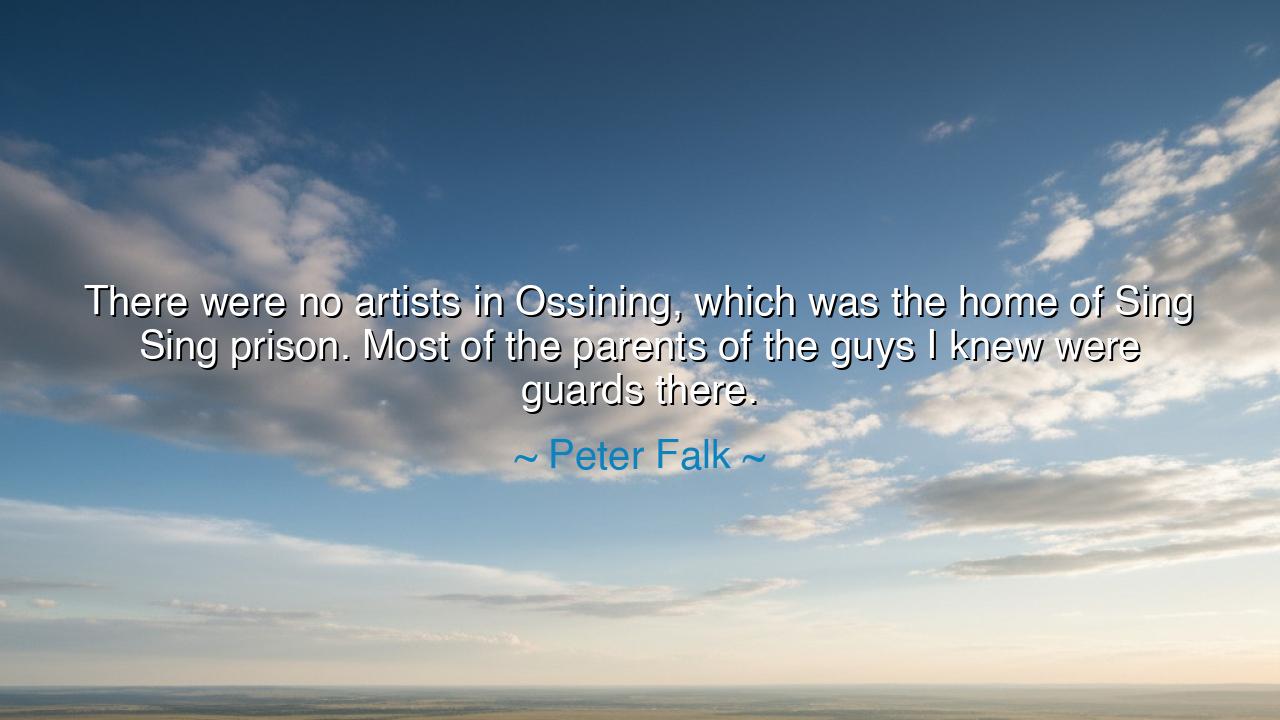
There were no artists in Ossining, which was the home of Sing
There were no artists in Ossining, which was the home of Sing Sing prison. Most of the parents of the guys I knew were guards there.






In the words of Peter Falk, the actor whose rough voice carried both wisdom and warmth, we find a quiet revelation about the birth of creativity in unlikely places: “There were no artists in Ossining, which was the home of Sing Sing prison. Most of the parents of the guys I knew were guards there.” At first, the quote seems simple, almost casual — a statement of fact about a small town. Yet beneath its plainness lies a meditation on origins, on how environment shapes the soul, and how some spirits, even when born among walls of discipline and order, awaken to the call of imagination. Falk’s words speak to the ancient struggle between confinement and creation, between the life one is born into and the life one dares to imagine.
Ossining, the place of his youth, stood in the shadow of Sing Sing prison, a name that conjures iron bars and the clang of restraint. The guards and their families lived in a world of duty and vigilance, where freedom was something to be watched over rather than celebrated. In such a world, art — the language of freedom, emotion, and defiance — was almost foreign. Falk’s remark that “there were no artists” is not just an observation of geography, but of culture: a reflection on how certain places, ruled by the necessity of order, leave little room for the rebellion of the creative mind. Yet it was from this very soil of structure and severity that he himself, an artist, emerged. This paradox is at the heart of his wisdom.
Throughout history, the greatest fires of creativity have often been lit in the coldest of places. Consider Fyodor Dostoevsky, who was imprisoned in Siberia, surrounded by despair and death, yet from that darkness produced works that still illuminate the human condition. Falk’s Ossining may not have been a prison, but its spirit — governed by rules and routine — mirrored one. In such an environment, to dream is an act of quiet resistance. The young Falk, surrounded by the sons of prison guards, must have felt like a stranger to his own upbringing, sensing within himself a longing for something beyond duty, something that spoke of truth, emotion, and the human soul. It is this longing that becomes the seed of artistry.
The ancients would have understood his journey. The Greek philosopher Plato spoke of the “cave” — a place where men see only shadows of reality, mistaking them for truth. The artist, Plato said, is the one who dares to leave the cave, to step into the sunlight and return with visions the others cannot yet see. So it was with Falk: born in the figurative shadow of the prison walls, he carried within him the courage to seek a different kind of freedom — the freedom of expression. His art became a defiance of limitation, a bridge between the world he came from and the one he created through performance.
Yet Falk’s tone, in speaking these words, is not bitter but reflective. There is humility in his recognition that he did not come from a land of poets or painters, but from ordinary men and women who served the machinery of order. In that humility lies the universality of genius — the truth that greatness is not born only in salons and studios, but in every corner where a soul refuses to be confined. His story reminds us that the seed of creativity can sprout even in barren ground, and that what matters is not where one begins, but what one dares to become.
The lesson, then, is clear: environment does not dictate destiny. Even if you are born among walls of habit, where imagination is scarce and art is unknown, you hold the power to break free. The world may teach you to obey, to conform, to guard the gates of convention — but within you burns the capacity to create, to envision, to transform. Falk’s words remind us that the artist’s duty is not to belong, but to reveal; not to reflect the world as it is, but to show it what it could be.
And so, let this teaching endure: greatness often begins in obscurity. The prison may stand beside your home, the guards may fill your neighborhood, and the voices around you may speak only of practicality — but if your heart beats to a different rhythm, honor it. Do not wait for permission to create beauty where none exists. For as Peter Falk showed through his life and words, even in the shadow of iron bars, one may learn to see the light — and in doing so, become the light for others.






AAdministratorAdministrator
Welcome, honored guests. Please leave a comment, we will respond soon